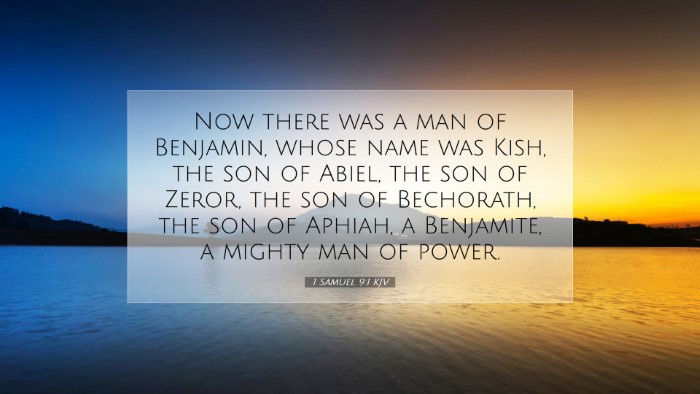Commentary on 1 Samuel 9:1
This verse initiates a significant narrative in the biblical history of Israel, marking the transition from the period of the judges to the monarchy. We will explore insights from notable public domain commentaries, offering a synthesis that is particularly beneficial for pastors, students, theologians, and Bible scholars.
Text of 1 Samuel 9:1
"Now there was a man of Benjamin, whose name was Kish, the son of Abiel, the son of Zeror, the son of Bechorath, the son of Aphiah, a Benjamite, a mighty man of power."
Contextual Background
The book of 1 Samuel sets the stage for a pivotal change in Israel's governance from judges to kings. At this juncture, the nation was in turmoil, and the need for stable leadership became pressing. Kish, the central figure of this verse, plays a crucial role in the context of Israel's demand for a king.
Historical Significance
As we consider the historical backdrop, it is essential to recognize the significance of the tribe of Benjamin and its representatives during this time. The Benjamites faced numerous challenges, and Kish's lineage as a "mighty man of power" indicates his prominent status among his people.
Insights from Matthew Henry
Matthew Henry, in his comprehensive commentary, emphasizes the providential hand of God in the selection of Saul. He notes the importance of Kish's family background, describing their prominence and significance in Benjamin. Henry points out that Kish's wealth and influence not only prepare Saul for leadership but also illustrate God's ability to use individuals from diverse backgrounds in His divine plan.
Henry states:
"Kish is described not merely as a man of substance, but as one who had a reputation for strength and military prowess, which would become essential in the tumultuous times ahead."
Insights from Albert Barnes
Albert Barnes provides a critical examination of the genealogy presented in this verse. He identifies that Kish’s lineage connects Saul to the tribe of Benjamin, which holds particular significance in Israel's history. Barnes highlights that Israel’s choice for a king (as will be elaborated upon in later chapters) reflects their desire for a leader who could provide both stability and protection against the surrounding nations.
Barnes articulates that Kish's attributes—his might and status—indicate that Saul would also possess qualities of a capable leader. However, this also leads to the caution against selecting leaders based solely on outward appearances or lineage:
"The momentous choice of a king should not be taken lightly, for the true measure of leadership is not in wealth or heritage, but in divine guidance and heart for the people."
Insights from Adam Clarke
Adam Clarke expands on the implications of the verse, exploring how the mention of Kish sets the stage for Saul’s emergence as king. Clarke reflects on the socio-political climate of Israel and how Kish’s family played a vital role amidst the cry for a monarch.
Clarke further emphasizes the moral lessons in the selection process of leaders. He states:
"In this account, we observe that God often chooses the weak and the seemingly unqualified to fulfill His plans, suggesting that true strength comes from reliance on divine providence."
Theological Reflections
This verse teaches us about God's sovereignty in guiding history and selecting leaders according to His will. It's essential to reflect on the character qualities that God values in leaders:
- Divine Purpose: Kish and Saul are part of a divine narrative, reminding us that God has a plan that transcends human understanding.
- Leaders Must Be Empowered: The qualities of strength and ability are important, but reliance on the Lord is paramount.
- Importance of Heritage: While Kish's lineage is significant, our ultimate trust must be in God rather than familial or societal status.
Conclusion
1 Samuel 9:1 provides a foundational understanding of God's unfolding plan in Israel's history as it transitions to monarchy. By studying the insights of Matthew Henry, Albert Barnes, and Adam Clarke, we deeply understand the complexities of leadership and the significance of divine intervention in guiding choices and actions.
As pastors, students, theologians, and Bible scholars, it's vital to glean from these commentaries not just knowledge but also a deeper reverence for God's sovereignty and the importance of our hearts in alignment with His will.


